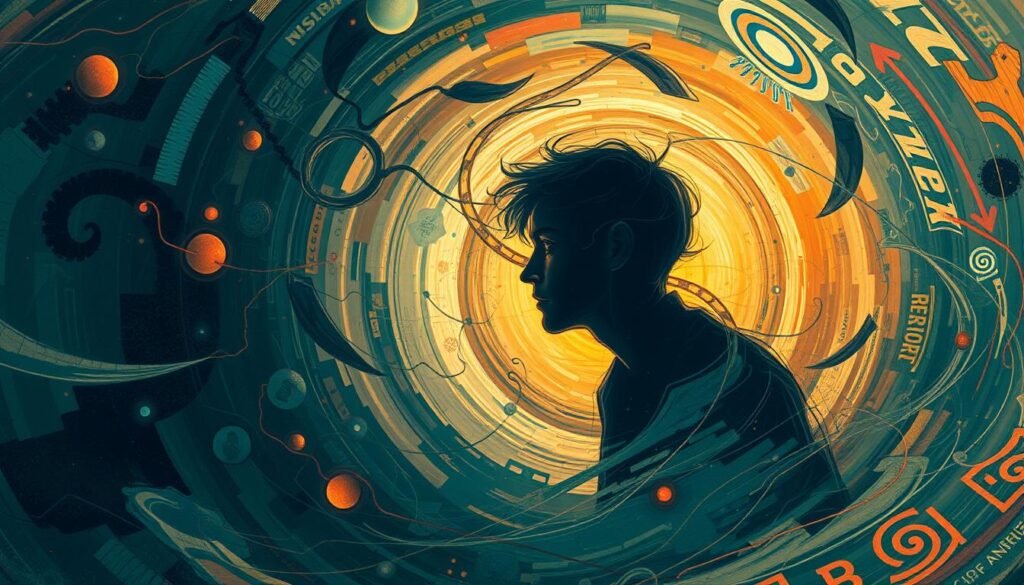Over 40 million adults in the United States battle anxiety disorders each year. This fact highlights a major health issue many face. Anxiety can lead to a troubling symptom: dizziness. Understanding when to seek help for anxiety-induced dizziness is vital. It’s important to know about the dizziness treatment options available. The reason? Dizziness often comes from changes in our bodies caused by anxiety. This includes fast breathing or sudden adrenaline surges. Knowing when to get medical attention is key for the right care.
This article will explore how anxiety and dizziness are connected. It stresses the need to get treatment quickly. Learning about anxiety symptoms and how they tie to dizziness helps. It helps people manage their health better.
Key Takeaways
- Anxiety disorders affect over 40 million adults in the US each year, with dizziness being a common symptom.
- Understanding the link between anxiety and dizziness is crucial for seeking effective treatment.
- Dizziness can trigger feelings of panic and may signal underlying health issues.
- Effective forms of dizziness treatment are widely available through professional support.
- Recognizing when to seek medical assistance can prevent worsening symptoms.
Understanding Anxiety-Induced Dizziness
Anxiety-induced dizziness often occurs during periods of high stress. It feels like lightheadedness or as if everything inside you is spinning. This can make anxiety worse, creating a tough cycle to break.
Many things can lead to dizziness. For example, people with vestibular system issues may feel dizzier when anxious. A German study found that dizziness is a top reason for adults seeking medical care. Over one quarter of those studied had anxiety with their dizziness.
Anxiety-induced dizziness can make everyday life hard. Besides feeling scared, anxiety can show up as physical dizziness. Conditions like vestibular neuritis and BPPV often come with uncomfortable dizziness. This is especially true for older people.
Yet, there’s hope for those struggling. Research shows physical therapy can help people with anxiety and dizziness. Treatments may include talking to a counselor, cognitive-behavioral therapy, or sometimes meds. Two-thirds of those taking SSRIs to ease dizziness found relief, despite some side effects.
Common Symptoms Associated with Anxiety
Anxiety shows up in many ways that differ from person to person. Some feel dizzy while others might sweat a lot, feel nervous, or have a fast heartbeat. Panic attacks are also common. Over time, chronic anxiety can make these symptoms feel worse.
There’s a strong link between chronic anxiety and dizziness. Studies have found that emotional upset can lead to conditions like vasovagal syncope, which causes fainting. Those with anxiety might also get vertigo, making dizziness more common. This shows how one symptom can make the other stronger.
It’s important to know these symptoms to manage them well. Different types of anxiety have different signs. For example, panic disorder brings on sudden panic. Generalized anxiety disorder means you worry a lot. Knowing your symptoms helps in tackling them effectively.

Realizing that anxiety can cause dizziness is helpful. Easy breathing techniques and relaxing exercises can reduce dizziness. This helps you handle your anxiety better. Knowing how chronic anxiety affects dizziness encourages seeking the right help and support.
| Symptom | Description |
|---|---|
| Nervousness | A feeling of restlessness and unease. |
| Sweating | Excessive perspiration, often unrelated to physical activity. |
| Rapid Heart Rate | Increased heartbeat often felt during anxiety episodes. |
| Panic Attacks | Sudden periods of intense fear that may include dizziness. |
| Dizziness | Sensation of lightheadedness or imbalance. |
Link Between Anxiety and Dizziness
Anxiety and dizziness often go hand in hand, troubling many people. A 2016 study found that about 29.4% of dizziness cases were due to anxiety. This happens because stress can change hormone levels in the body. High levels of cortisol can make you feel dizzy.
People with anxiety feel lightheaded a lot. This affects their day-to-day activities.
People who have anxiety disorders might also have inner ear problems. This can make them feel more anxious and dizzy. A 2016 study showed a strong link between anxiety disorders and vertigo. Vertigo is the most common kind of dizziness. People with anxiety might get Benign Paroxysmal Positional Vertigo (BPPV) more often than those without anxiety.
Being afraid of feeling dizzy can make anxiety worse. This creates a cycle that’s hard to break. When anxious, some people breathe too fast. This can make them dizzy or even faint. It’s important to see a doctor if dizziness lasts more than 15 minutes, especially with chest pain.
Knowing how anxiety and dizziness are connected can help treat them. Cognitive behavioral therapy and changes in lifestyle can make a difference. Using medication properly can also reduce dizziness. Learning to breathe calmly and staying away from caffeine can help manage anxiety and vertigo.
| Statistical Insights | Details |
|---|---|
| Prevalence of Anxiety Disorders | Affects about 19.1% of the American population. |
| Dizziness Attribution to Anxiety | 29.4% of dizziness cases linked to anxiety (2016 study). |
| Inner Ear Disorders | Higher likelihood in individuals with anxiety disorders. |
| Connection to Vertigo | Anxiety increases the risk of developing vertigo symptoms. |
| Diagnosis of BPPV | Patients with anxiety are more than twice as likely to develop BPPV. |
Causes of Dizziness in Anxiety Disorders
Dizziness often troubles those with anxiety disorders. Knowing why helps in handling this uneasy feeling. Mainly, dizziness comes from hyperventilation and panic attacks in anxiety cases.
Hyperventilation and Its Effects
When someone breathes fast or deep because of anxiety, it’s called hyperventilation. This leads to less carbon dioxide in the blood, causing symptoms like dizziness. The body tries to balance out, but you might feel like fainting. Knowing hyperventilation is a usual anxiety reaction helps in managing dizziness.
Panic Attacks and Dizziness
Panic attacks can be very scary and cause dizziness. They activate the body’s fight-or-flight reaction. This reaction can make your blood vessels narrow and your heart beat faster. These changes make dizziness worse and can upset your balance. This shows how panic attacks and dizziness are linked, affecting both mind and body.

Types of Dizziness: Chronic vs. Acute
Dizziness falls into two main groups: chronic and acute. Knowing the difference helps people understand their symptoms. It also encourages them to get the right support.
Chronic dizziness means feeling off balance often, affecting daily tasks. It is usually linked with anxiety disorders, leading to a constant sense of being unsteady. This makes life tough for those who deal with it for a long time.
Acute dizziness happens suddenly and lasts for a short period. It may come during a panic attack, causing a quick feeling of losing balance. Recognizing these episodes as part of anxiety is key for those affected.
Dizziness has many causes. For instance, benign positional vertigo is more common as we age. It causes dizziness when you move your head a certain way. Another cause, orthostatic hypotension, makes people feel like they will faint when standing. It’s important to know what may be causing your dizziness. For more on this topic, check out this informative article.
Understanding how anxiety and dizziness interact helps manage them. Changes in lifestyle and specific treatments can ease these dizzy feelings. It’s good to know when these symptoms occur and their triggers. This can help find any underlying issues or when to seek professional help.

When to Seek Medical Help for Anxiety-Induced Dizziness
Knowing when to get help for anxiety-induced dizziness is key. Sometimes, severe dizziness isn’t just from anxiety. It might be due to other reasons like how suddenly it happens, how long it lasts, and other symptoms that come with it. Getting advice from a doc fast can prevent worse problems.
Signs That Require Immediate Attention
Some symptoms mean you need help right away. If someone has:
- Severe dizziness that starts out of nowhere
- Symptoms that come with fainting, throwing up, or being confused
- Dizziness that doesn’t go away for hours
- Ear pressure or fullness, which could be Meniere’s disease
All these symptoms could be warning signs of bigger health issues. For example, dizziness with dehydration or serious anemia needs fast treatment. Symptoms like chest pain could be even more dangerous.
Consulting Professionals About Chronic Dizziness
If dizziness keeps happening, seeing a doctor is crucial. People with ongoing dizziness should think about:
- Getting balance and imaging tests like MRI or CT scans
- Talking about any possible causes related to anxiety or other health problems
- Looking into treatments that address both anxiety and physical issues
Getting advice from medical experts is vital for managing dizziness well. Long-lasting dizziness might mean more serious health conditions need attention. Getting ahead of the problem with doctors’ help can lead to better health and stability.
Treatment Options for Anxiety-Induced Dizziness
Finding the right treatment for anxiety-induced dizziness is key. It could include therapy, medications, and changes in your daily life. These steps can greatly improve your health and handle the dizziness better.
Therapy and Counseling
Therapy is vital in managing anxiety, especially when it causes dizziness. Cognitive Behavioral Therapy (CBT) helps people understand what triggers their anxiety. It shows them how to respond differently. The Epley maneuver and balance therapy might also lessen dizziness.
Talking with a therapist provides emotional support and tackles anxiety issues leading to dizziness. Getting the right therapy makes a big difference for those affected.
Medications and Lifestyle Changes
Medications are important in treating dizziness. Anti-anxiety meds bring quick relief. Antidepressants are good for the long haul. Making changes in your life matters too.
Exercise regularly, drink lots of water, and eat balanced meals to boost your health. Avoiding caffeine and booze could reduce dizziness. Small everyday changes are a big help in controlling anxiety. For more tips on treatments, check out this resource.
| Treatment Option | Description | Benefits |
|---|---|---|
| Therapy | Cognitive Behavioral Therapy (CBT) and vestibular rehabilitation | Helps manage anxiety and improve balance |
| Medications | Benzodiazepines and antidepressants | Provides relief from anxiety and dizziness |
| Lifestyle Changes | Regular exercise, hydration, and nutrition | Enhances overall health and reduces symptoms |
Preventive Measures Against Anxiety-Induced Dizziness
Anxiety-induced dizziness can be really unsettling. However, certain strategies can help manage it. By adopting good breathing practices, staying hydrated, and eating well, one can find notable improvement. This also boosts their overall health.
Breathing Techniques
Breathing methods are key for preventing dizziness. Taking slow, deep breaths helps combat the rapid breathing seen with anxiety. Practices like diaphragmatic breathing or the 4-7-8 technique—inhale for four, hold for seven, exhale for eight—aid in calming down. Using these regularly can ease symptoms and increase resilience over time.
Hydration and Nutrition
Keeping hydrated and eating right are crucial. Drinking enough fluids ensures your body functions well and can lessen dizziness episodes. A diet rich in vitamins and minerals boosts your mental health. Antioxidants, Omega-3s, and complex carbs help regulate mood and energize the body to fight anxiety. This means eating lots of fruits, veggies, whole grains, and lean meats.
If you often feel dizzy, these strategies might help prevent it. For ongoing issues, checking out health guidance services might offer further help and advice.
| Preventive Strategy | Benefits |
|---|---|
| Breathing Techniques | Reduces hyperventilation, calms nervous system |
| Hydration | Maintains optimal body function, reduces dizziness |
| Nutrition | Supports mental health, stabilizes mood |
Conclusion
Dizziness is common, especially for those with anxiety. It’s key to understand how anxiety and dizziness are linked. Knowing the signs and getting help can greatly improve one’s health.
Dizziness can be worrying, but it’s often something you can manage. By staying hydrated or treating health issues, you can lessen the discomfort. It’s important to act fast if dizziness comes with serious symptoms.
Taking care of your mental health can make you feel supported. Facing anxiety and using the right tools can help you feel stable. This way, you gain back your confidence in daily activities.